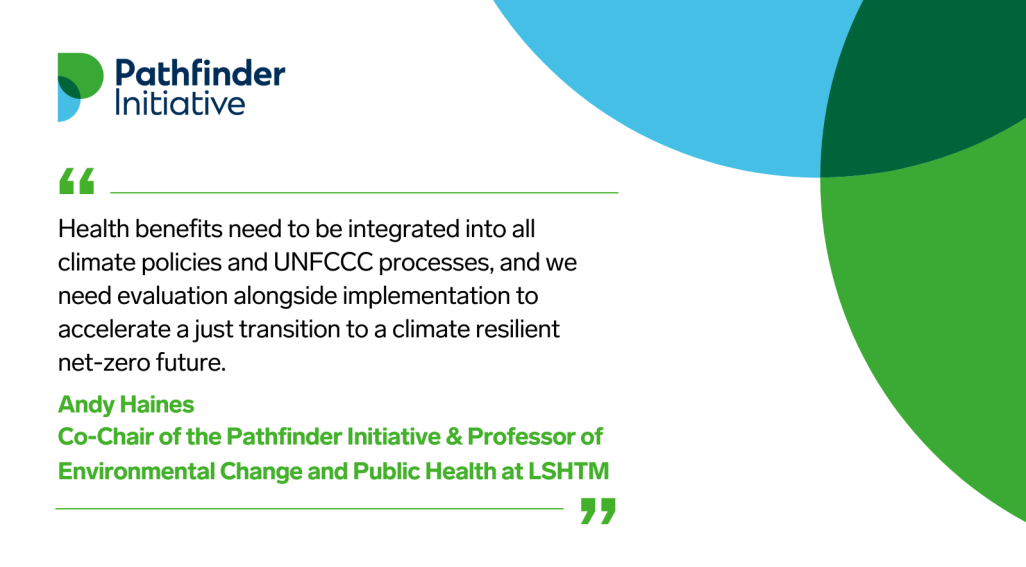Moving towards a net-zero economy provides huge opportunities for health, including through cleaner air from fossil fuel phase out, healthier more sustainable diets, and increased physical activity levels, leading climate and health expert Professor Andy Haines has told COP29.

In a speech at the 29th United Nations Climate Change Conference, Professor Haines, Co-Chair of the Pathfinder Initiative and Professor of Environmental Change and Public Health at the London School of Hygiene & Tropical Medicine (LSHTM), said: “Cutting greenhouse gas emissions across all sectors can bring very large benefits to health in the near-term.
“Health benefits need to be integrated into all climate policies and UNFCCC processes, and we need evaluation alongside implementation to accelerate a just transition to a climate resilient net-zero future.”
As COP29 passes its halfway point, Professor Haines presented evidence from the Lancet Pathfinder Commission report at an event on “Maximising health co-benefits: linking climate action to public health gains”, hosted by the World Health Organisation (WHO) during the Alliance for Transformative Action on Climate and Health (ATACH) day at the Health Pavilion.
Highlighting case studies of climate solutions that benefit health from the Pathfinder Initiative Climate and Health Evidence Bank, Professor Haines emphasised the importance of measuring the impacts of actions on health and greenhouse gas emissions reductions. Examples from the Pathfinder Initiative included the health and economic benefits of transitioning to renewables in the US; physical and mental health improvements and energy cost savings from home energy efficiency upgrades in Victoria; more active communities and safer roads through the "Más Bicis, Menos Emisiones" Programme in Buenos Aires; and a community-led initiative in Indonesia to reduce deforestation and improve access to healthcare.
His keynote speech was part of one of a wide range of events at this year’s conference which have spotlighted health as the argument for climate action.
Monday 18 November marked human development, health, education, children and youth day in the thematic programme. COP28 saw unprecedented focus on health, including through the first ever health day and the UAE Declaration on Climate and Health. Building on this momentum, this year health has been a central focus of high-level events and initiatives including the Baku COP Presidencies Continuity Coalition that will ensure ongoing prominence of health at COP30 and COP31. Health has also pervaded broader discussions, highlighting its importance as a cross-cutting issue.
The Pathfinder Commission report and recent WHO COP29 special report on climate change and health that drew evidence from the Pathfinder Initiative, highlight that health benefits deliver near-term, life-saving gains and can motivate policymakers to act. But climate mitigation actions need to be rapidly scaled up and integrated with adaptation actions to capitalise on these health benefits.
The latest UNEP Emissions Gap report showed that globally emissions cuts of 42% are needed by 2030 and 57% by 2035 to get on track for 1.5°C. With updated Nationally Determined Contributions due by February 2025, now is the time for countries to make more ambitious commitments aligned with the Paris Agreement target to protect and promote health. Wealthier countries have a responsibility to make the deepest most rapid cuts, and must step up to provide adequate finance for developing, climate-vulnerable countries.
Urban action on climate and health has also been a key point of discussion, with urbanisation among conference themes. While cities are on the frontline of climate change, they also offer opportunities for transformative change. Cities in Africa are projected to have the fastest growth rate in the world, and harnessing synergies between climate and health policies will be key to ensuring low carbon climate resilient urban development.
Dr Sarah Whitmee, Assistant Professor at LSHTM and Co-PI of the Pathfinder Initiative; Aimée Aguilar Jaber, Programmes Director of the Hot or Cool Institute and Lancet Pathfinder Commissioner; Dr Nurudeen Alhassan, Senior Research and Policy Analyst at the African Institute for Development Policy (AFIDEP) and part of the AFIDEP Pathfinder Initiative team; and Dr Vicente Ruiz from the (Organisation for Economic Co-operation and Development) OECD Development Centre, explored the potential for climate and health action in African cities in a panel on “Climate Change and Health: Crafting Policies for Africa's Urban Future”, hosted at the OECD COP29 virtual pavilion. The event highlighted how climate mitigation policies can shape health outcomes across cities in Africa and the role of systems thinking in contributing to these efforts.
Highlighting the opportunity for climate and health action in cities, Dr Whitmee said: “Evidence shows that there are significant opportunities for switching to low carbon options in sectors such as energy, food and transport in ways that improve health and equity. Integrating the natural environment through nature-based solutions can also provide mitigation benefits while buffering against climate impacts.”
Dr Alhassan said: “Coordination mechanisms are needed to mainstream climate and health at the national policy level and to facilitate implementation at the local level. There is also currently limited data on the impact of climate mitigation on health in Africa and a need for strengthened capacity for evidence generation to inform policy.”
The Pathfinder Initiative and partners are also looking ahead to COP30 and opportunities for centring health in the climate agenda beyond this COP. Hugh Sharma Waddington, Assistant Professor at LSHTM and part of the Pathfinder Initiative research team, will take part in a panel discussion hosted by the Wellcome Trust on “The Road to Belem: connecting health, science and Indigenous Knowledge”, focusing on how voices from health, science and Indigenous Peoples can work together to accelerate climate action to ensure a healthier future for all.